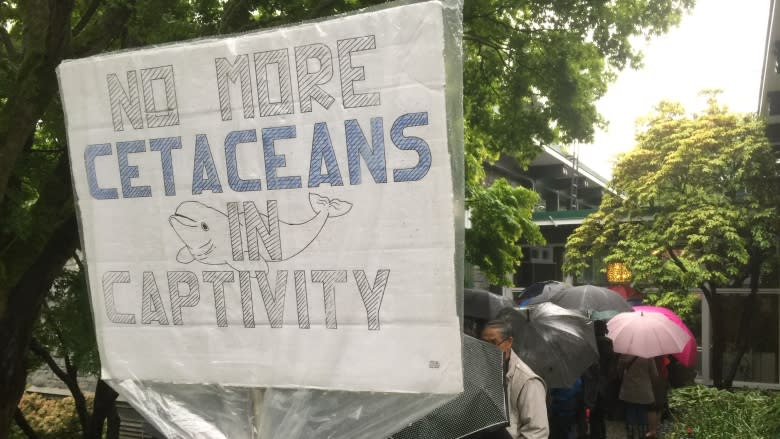Vancouver Park Board officially ends display of new cetaceans at aquarium
The Vancouver Park Board has approved bylaw amendments officially banning the Vancouver Aquarium from bringing in new dolphins, whales and narwhals.
Commissioners approved changes to the Parks Control bylaw that would prevent the aquarium from bringing in the animals known as cetaceans — a group that includes narwhals, dolphins, porpoises, killer whales and beluga whales — and bans "a show, performance or other form of entertainment, which includes one or more cetaceans."
Park board commissioner Catherine Evans said the bylaw allows Vancouver to "catch up" in terms of the ethical treatment of animals.
"It's not only can you do this, but should you do this," she said. "And so, I think, yes we can keep cetaceans in captivity ... but I think we have reached the point now where we know that we shouldn't where there are other options."
But John Nightingale, the aquarium's president and CEO, said in a statement Monday night that the move will force rescuers to euthanize animals that can't be released back into the wild.
"There are no other long-term homes or options in Canada for rescued, non-releasable cetaceans," he said.
Six commissioners voted in favour of the motion, with independent commissioner Erin Shum voting against it. The discussion over the amendments were brief, as the park board had already unanimously approved a motion in March asking staff to bring forward the amendments.
But the debate, coming after years of emotional discussions over the future of the aquarium's cetacean program, was watched by hundreds of protesters, inside and outside the meeting, who loudly denounced the park board's decision.
'We're not giving up'
In a soggy field minutes after the motion passed, Nightingale addressed the many supporters who stood and chanted for hours outside the Park Board meeting.
"I know you'll stand with me and not give up," he said to the crowd, who responded with their own round of "We're not giving up!"
Debate over the future of cetaceans at the facility has been simmering for some time. Those in favour of a ban highlighted quality of life concerns for captive animals, while those in favour of the status quo argued for the educational and awareness opportunities they presented for the general public.
"We will continue to oppose what the park board has just done in various ways, and fight for the right to help the animals who need help when they're stranded on our coast, and to help connect the public with what's going on in nature," said Nightingale.
"It's very much the aquarium's mission, and I don't care whether you're a jellyfish, a salmon, a harbour seal or a dolphin. You play a major role in that connection."
But that battle will be decidedly uphill. Just three cetaceans remain at the aquarium: a false killer whale, a harbour porpoise and a Pacific white-sided dolphin.
Several park board commissioners have said the public sentiment has shifted in recent years to being generally against holding large animals at the facility, particularly after two belugas died at the aquarium after being exposed to an unidentified toxin.
"We stood up and we stood for something," said NPA park commissioner Sarah Kirby-Yung.
She was previously the aquarium's spokesperson, and was elected in 2014 promising to reverse an aquarium breeding ban imposed by a prior park board — but voted in favour of the motion Monday.
"At the end of the day this isn't a political decision, this is the right decision."
Future of rehab activities unknown
Aside from an end to importing new cetaceans and shows, the decision puts into question how injured animals rescued by the aquarium will be cared for.
"We have a facility, it's a hospital, intensive-care facility. It's a great facility, but not where we can do long-term care," said Dr. Martin Haulena, head veterinarian at the Vancouver Aquarium, referring to the Marine Mammal Rescue Centre, which is not on Park Board land.
"If we don't have a place to house animals that can't be released, that's devastating to our research program."
It was a charge sharply rejected by commissioner Stuart MacKinnon, who voted in favour of the ban.
"The choice of whether the [centre] continues to work with cetaceans is entirely their jurisdiction, it is entirely their decision," he said.
"It is our decision to decide what goes on in our parks."
With files from The Canadian Press



